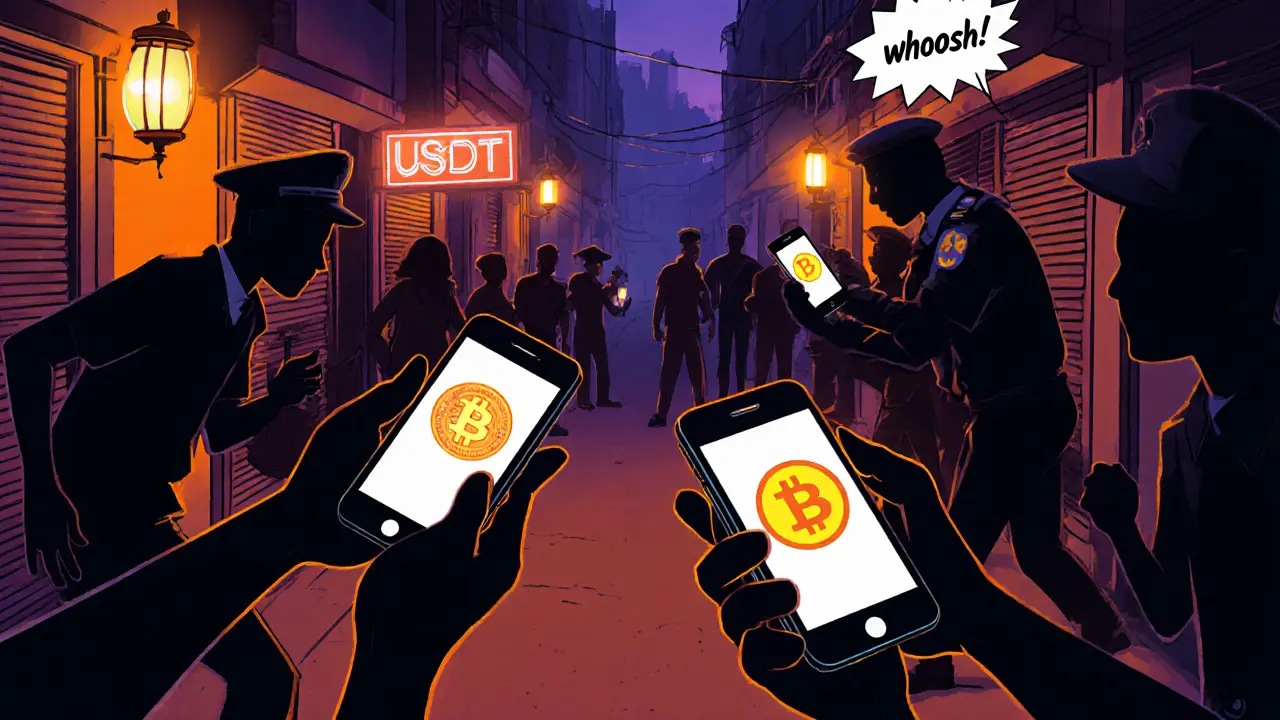Myanmar Crypto Ban Explained: Central Bank Directive 9/2020
 May, 12 2025
May, 12 2025
Myanmar Crypto Risk Calculator
About This Tool
This calculator estimates the potential legal consequences of engaging in cryptocurrency activities in Myanmar under Directive 9/2020 and related laws.
Enter details and click "Calculate Risk Level" to see estimated legal consequences.
Risk Factors Explained
- Holding: Possession alone can lead to account freezing or fines.
- Buying/Selling: Direct transactions carry higher penalties including imprisonment.
- Transferring: Any movement of funds triggers enforcement scrutiny.
- Stablecoins: Especially USDT, widely targeted due to remittance use.
- Platforms: Local banks are strictly monitored; encrypted platforms reduce detection risk but still pose danger.
On May 15, 2020, the Central Bank of Myanmar (CBM) issued Myanmar Central Bank Directive 9/2020, a sweeping order that made any transaction involving unregulated digital currencies illegal for residents. The directive cited Sections40(e) and62 of the Central Bank of Myanmar Law, declaring the CBM the sole authority to issue and manage the nation’s legal tender. In plain English, buying, selling, swapping or even transferring cryptocurrencies like Bitcoin, Ethereum, Litecoin, or stablecoins such as USDT now carries the risk of fines, imprisonment, or frozen bank accounts.
Legal Foundations of the Ban
The ban sits on three overlapping statutes:
- Foreign Exchange Management Law - restricts cross‑border currency movements.
- Financial Institutions Law - bars banks from facilitating crypto‑related services.
- Anti‑Money Laundering Law - treats illicit crypto transfers as money‑laundering offenses.
Because digital assets are not recognized as legal tender, the CBM explicitly warned that any “sale, purchase, exchange, or transfer” of unregulated cryptocurrencies is prohibited.
Scope of the Directive
Directive9/2020 lists specific tokens-Bitcoin (BTC), Litecoin (LTC), Ethereum (ETH), and Perfect Money (PM)-but the language is broad enough to cover any future digital currency. The notice also targets social‑media channels, especially personal Facebook accounts, where many Myanmar users previously posted trade offers. Financial institutions are ordered to freeze accounts linked to crypto activity and report suspicious transactions.
Enforcement Journey: From Warning to Action
Initially the CBM’s stance was advisory; individuals were told they acted “at their own risk.” The real shift came in May2024, when the CBM re‑issued a public notice confirming that violations would trigger account closures and criminal prosecution. Since then, several high‑profile cases have emerged:
- Domestic money‑changers using USDT for hundi transfers were arrested and faced up to three years’ imprisonment.
- Bank accounts of known crypto traders were frozen under the Financial Institutions Law.
- Authorities have begun seizing mobile devices suspected of housing encrypted Telegram groups used for peer‑to‑peer (P2P) trades.
Penalties range from fines of up to 5millionkyat to jail terms, often applied in combination.

Regional Contrast: How Myanmar’s Policy Stacks Up
| Country | Regulatory Approach | Key Legal Instruments | Enforcement Tone |
|---|---|---|---|
| Myanmar (military‑run) | Complete ban (Directive9/2020) | Central Bank Law, AML Law, Financial Institutions Law | Active - account closures, arrests |
| Thailand | Licensing regime for exchanges | Crypto Business Act 2022 | Regulatory compliance focus |
| Singapore | Regulated crypto service providers | Payment Services Act 2020 | Enforcement through fines, warnings |
| ElSalvador | Bitcoin as legal tender | Bitcoin Law 2021 | State‑driven adoption, limited enforcement |
Unlike its neighbors, Myanmar has taken the toughest line, opting to criminalize all crypto activity rather than craft a licensing framework.
Underground Crypto Economy: What’s Happening on the Ground?
Despite the official ban, a vibrant informal market has flourished. Peer‑to‑peer trades now dominate, with Telegram groups acting as virtual marketplaces. Offshore exchanges based in Singapore or Malaysia receive deposits from Myanmar users, who then move USDT, especially on the Tron network, to bypass capital controls.
Coinfomania’s 2024‑2025 data shows:
- USDT accounts grow by 78% year‑over‑year.
- Average P2P transaction size hovers around 0.5BTC (≈$16,000 at 2025 rates).
- Internet shutdowns during political unrest cause short‑term spikes in offline cash‑to‑crypto conversions.
Many citizens view stablecoins as a hedge against the crashing kyat and a cheaper way to send remittances abroad.
Political Twist: The NUG’s Counter‑Move
The opposition National Unity Government (NUG) announced in December2021 that Tether (USDT) would be treated as legal tender within areas it controls. This directly clashes with the military‑run CBM’s prohibition. In early2023 the NUG even floated plans for a home‑grown token-Digital Myanmar Kyats (DMMK)-backed by a mobile wallet designed for low‑bandwidth environments.
While the NUG’s initiatives lack nationwide reach, they illustrate a split‑policy landscape where two governments promote opposing crypto strategies.

Challenges Facing Enforcement
The decentralized nature of blockchain makes total suppression technically impossible. The CBM’s focus on Facebook‑based ads and traditional banks leaves a blind spot: encrypted messaging apps and offshore platforms. Moreover, repeated internet blackouts-used as a political weapon-often interrupt monitoring tools, giving traders brief windows to execute larger swaps.
Legal experts at Tilleke&Gibbins note that enforcement has been “selective but increasingly aggressive,” especially targeting domestic currency converters who use USDT for hundi operations.
Future Outlook: Will the Ban Hold?
Three scenarios appear plausible:
- Escalated crackdown: The CBM could tighten penalties, introduce a dedicated cyber‑crime law, and partner with telecoms to block VPN traffic.
- Regulatory softening: Economic pressure may force a shift toward a licensing model, similar to Thailand’s approach, allowing vetted exchanges.
- Policy stalemate: Ongoing political fragmentation keeps the ban in place, while the underground market continues to grow unchecked.
Given the persistent demand for stablecoins as remittance tools and the low cost of P2P platforms, a complete eradication of crypto activity seems unlikely. Investors and residents should therefore treat the ban as a high‑risk legal environment rather than an absolute barrier.
Key Takeaways for Stakeholders
- Any direct involvement with cryptocurrencies inside Myanmar can lead to frozen bank accounts, hefty fines, or imprisonment.
- USDT on the Tron network dominates the underground market because of its low transaction fees.
- Regulatory enforcement targets visible channels (banks, Facebook) but is less effective against encrypted messaging and offshore exchanges.
- The NUG’s alternative crypto initiatives signal a political fracture that could reshape the country’s future fiscal landscape.
- International observers should monitor Myanmar’s crypto landscape as a barometer for how authoritarian regimes handle decentralized finance.
Frequently Asked Questions
Is it illegal to own Bitcoin in Myanmar?
Yes. Under Directive9/2020, holding, buying, selling, or transferring Bitcoin is prohibited for residents. Violations can result in fines, account closures, or imprisonment.
What penalties can the Central Bank impose?
Penalties include up to 5millionkyat in fines, up to three years in prison, and the forced closure of any bank accounts linked to crypto transactions.
Can I use stablecoins like USDT for remittances?
Technically yes, but doing so violates the ban. Many users trade USDT on Telegram or offshore platforms, exposing themselves to legal risk if identified by the CBM.
How does the NUG’s crypto policy differ?
The opposition’s National Unity Government has declared USDT a legal tender in territories it controls and is developing its own token, DMMK, directly opposing the military government’s outright ban.
Is there any legitimate way to trade crypto in Myanmar?
As of 2025, no licensed exchanges operate within the country. All crypto activity is informal and therefore falls under the ban, making any trade inherently illegal.
Rama Julianto
May 12, 2025 AT 19:15Listen up-Directive 9/2020 from Myanmar’s central bank is a hard‑line clampdown on any crypto activity, and the penalties aren’t just a slap on the wrist. Holding a coin can trigger account freezes, buying or selling can land you in jail, and even moving stablecoins like USDT is treated as a serious offence. The law doesn’t differentiate between small‑scale traders and big exchanges; everything falls under the same high‑risk bucket. If you’re using a local bank, expect the highest scrutiny, and if you think using Telegram hides you, think again. The government has already shown it will seize funds without warning, so staying “under the radar” is a myth. In short, the risk calculator isn’t a game-treat every entry as a potential legal trap.
Helen Fitzgerald
May 14, 2025 AT 04:35Hey everyone, if you’re dabbling in crypto while the ban is active, the safest move is to pull back until the legal landscape clears up. The central bank’s directive is crystal‑clear about freezing accounts, imposing fines, and even criminal charges for what they deem illegal transfers. I get that many rely on crypto for remittances, but the price you pay could be your freedom. Use this space to share how you’re navigating the restrictions without breaking the law-maybe someone has a legit alternative for cross‑border payments that complies with the new rules.
Jon Asher
May 15, 2025 AT 13:55The ban covers holding, buying, selling, and transferring any cryptocurrency, plus stablecoins like USDT and USDC. Local banks are flagged as high‑risk, while social media platforms and encrypted chats still attract attention from authorities. Even peer‑to‑peer trades aren’t safe; the central bank can still trace transactions through the blockchain and take action. So whether you’re just storing a few coins or running a small exchange, the legal exposure is significant.
Scott Hall
May 16, 2025 AT 23:15Totally agree with the overview-when you’re dealing with a regime that watches every digital move, the safest advice is to keep crypto completely out of your daily life. If you must move funds, consider using reputable offshore services that have clear compliance frameworks, but even those can be flagged. In practice, many have switched to traditional remittance services that are officially recognized, which cuts down the risk of a sudden account freeze. Bottom line: treat every transaction as if it could be your last before the authorities step in.
Jade Hibbert
May 18, 2025 AT 08:35Sure, ignoring a government ban always works out great.
Leynda Jeane Erwin
May 19, 2025 AT 17:55Formally speaking, the penalties outlined in Directive 9/2020 range from hefty monetary fines to up to five years of imprisonment for repeat offenders. Casual observers often overlook the fact that the central bank has the authority to coordinate with law‑enforcement agencies to freeze assets instantaneously. While the language may appear bureaucratic, the enforcement is anything but. In practice, this means that even a seemingly innocuous transfer via a messenger app can trigger a crackdown. Therefore, any crypto‑related activity should be evaluated against both the written law and the demonstrated willingness of authorities to act swiftly.
Brandon Salemi
May 21, 2025 AT 03:15Imagine waking up to a frozen bank account because you bought a few coins last week.
hrishchika Kumar
May 22, 2025 AT 12:35That scenario feels like a nightmare ripped straight from a thriller, yet it’s becoming a reality for many in Myanmar. The emotional blow of losing access to your savings is compounded by the legal uncertainties that follow. When the state decides to weaponize financial controls, ordinary people end up paying the price. I’ve heard stories of families forced to sell assets at a loss just to cover legal fees after a crypto‑related investigation. The takeaway? Treat crypto like a high‑stakes gamble in this environment.
Anjali Govind
May 23, 2025 AT 21:55For anyone on the ground, the risk calculator actually breaks down each activity into a clear risk tier-holding lands you in the “medium” zone, while buying or selling pushes you into “high.” The platform you choose matters too; offshore exchanges are less likely to be immediately flagged, but they still operate under Myanmar’s jurisdiction when funds eventually flow back into local banks. Use the tool to map out the worst‑case scenario before you commit any USD‑equivalent amount, and consider diversifying into assets that aren’t on the regulatory radar.
Ted Lucas
May 25, 2025 AT 07:15TL;DR: Myanmar’s crackdown = crypto‑terror 🚨. The central bank’s Directive 9/2020 classifies all digital asset movements as “high‑risk financial operations.” ✅ Holding: account freeze risk. ✅ Buying/Selling: imprisonment risk. ✅ Transferring: enforcement scrutiny. 📊 The penalty matrix is stacked, and the enforcement engine is already humming. If you’re still thinking about a quick trade, remember the clause that lets authorities seize any crypto‑related assets without prior notice. 😅💸
ചഞ്ചൽ അനസൂയ
May 26, 2025 AT 16:35When a state decides to criminalize a form of finance, it’s not just about money-it’s a statement about sovereignty and control. The Myanmar government sees decentralized currencies as a threat to its monetary authority, and the heavy‑handed approach reflects a deeper anxiety over losing grip on capital flows. Philosophically, this raises questions about the balance between individual financial freedom and collective economic stability. In societies where traditional banking is already fragile, imposing such bans can push people toward underground channels, which paradoxically increase the very risks the ban aims to eliminate. So the crackdown, while harsh, may unintentionally fuel a shadow economy that operates beyond the reach of official oversight.
Jacob Moore
May 28, 2025 AT 01:55That’s a solid perspective-if you’re looking for ways to stay compliant, the safest route is to use government‑approved remittance services, even if they’re slower or more expensive. Those channels have built‑in safeguards that align with the central bank’s regulations, meaning you won’t be caught in the crosshairs of a crackdown. For anyone still considering crypto, I’d suggest setting up a legal counsel review before making any moves, especially if you’re dealing with amounts over a few hundred dollars. Staying ahead of the legal curve can save you a lot of headaches later.
Carol Fisher
May 29, 2025 AT 11:15Crypto is a tool of foreign influence, a digital Trojan horse meant to undermine national financial sovereignty. Allowing citizens to trade in unregulated coins opens the door to money‑laundering, illegal financing, and erosion of cultural values. The Myanmar government is right to act decisively; any lax attitude toward digital assets would be tantamount to handing the nation over to external interests. 🇲🇲💪
Melanie Birt
May 30, 2025 AT 20:35Directive 9/2020 breaks down the legal consequences into three core categories: account restrictions, monetary penalties, and criminal prosecution. First, any account that is linked to crypto transactions can be frozen without prior notice, effectively locking users out of their own funds. Second, the central bank imposes fines that start at 5 percent of the transaction value and can rise to 30 percent for repeated violations. Third, the criminal code stipulates imprisonment ranging from one to five years, with harsher sentences for large‑scale operations. The law also gives regulators the authority to seize assets that are deemed to be the proceeds of illegal crypto activities, and this seizure can extend to related bank accounts and property. Moreover, the directive explicitly mentions stablecoins such as USDT and USDC, treating them with the same level of scrutiny as traditional cryptocurrencies. Enforcement agencies have been equipped with blockchain analytics tools that can trace transactions across mixers and tumblers, so the myth of anonymity is largely debunked in this context. For individuals, the practical impact means that even a modest purchase of Bitcoin through a peer‑to‑peer network can trigger a full investigation. Businesses operating exchange platforms are required to register with the central bank, submit regular transaction reports, and undergo periodic audits. Failure to comply can result in the revocation of their operating license, effectively shutting down the service overnight. On the international front, foreign exchanges that serve Myanmar residents are now subject to secondary sanctions if they facilitate prohibited activities. This creates a ripple effect, discouraging overseas platforms from onboarding Myanmar users altogether. In summary, the risk calculator reflects a legal environment where every crypto‑related action is potentially criminal, and the cost of non‑compliance far outweighs any short‑term gains.
Siddharth Murugesan
June 1, 2025 AT 05:55Another glorified legal brief that pretends to be helpful while ignoring the real human cost. All this jargon about fines and seizures just masks the fact that ordinary people are being trapped in a punitive system with no clear path to redemption. Instead of laying out practical solutions, you’ve turned the comment into a dry policy paper that does nothing but intimidate. It’s a classic case of techno‑paternalism, and it’s completely out of touch with the everyday struggles of folks trying to survive under an oppressive regime.
Hanna Regehr
June 2, 2025 AT 15:15Balancing the stark realities with a measured outlook, it’s clear that the central bank’s directive creates a high‑risk environment for any crypto engagement. While the penalties are severe, there are still avenues-such as fully compliant remittance services and thorough legal counsel-that can mitigate personal exposure. The key is to stay informed, use the risk calculator wisely, and avoid any activity that could be construed as evading the ban. Ultimately, prudence and compliance are the best defenses against unexpected legal repercussions.
Ben Parker
June 4, 2025 AT 00:35Just a heads‑up: if you’re planning to experiment with crypto on the side, remember that the authorities are already monitoring social media chatter, so keep your discussions low‑key.
Daron Stenvold
June 5, 2025 AT 09:55Indeed, the surveillance mechanisms extend beyond financial institutions to encompass digital communications, making any overt discourse a potential trigger for enforcement action. In such a tightly controlled environment, discretion becomes not just advisable but essential for personal safety.